Start 14-Day Trial Subscription
*No credit card required

How to Trade Beer Online
In the world of craft beer, there is a thriving subculture that continues to grow beneath the surface, impacting the entire industry. I’m speaking, of course, of the beer trading scene.
The concept is simple enough: Trade a beer you have for one you want or one that might not be as readily available in your area.
Despite that simple definition, there is much, much more that goes into this popular hobby – knowing the etiquette, learning the language and navigating some of the legal and ethical challenges of trading beer.
The act of bartering is nothing new. People have been exchanging goods and services for centuries. As the number of breweries, beer styles, and beer options increased and drinkers’ interests grew over the last few decades, the practice of trading beer skyrocketed. Websites such as Beer Advocate and RateBeer have seen trading activity since the late 90s. Until earlier this year, Reddit had been a prominent hot spot for beer trades since 2005. (A spokesperson said the site updated its content policy to forbid transactions on alcohol.)
But the true fuel to the fire came from the rise of social media. Facebook groups devoted to trading beer are in abundance. The Craft Beer Trading Society has more than 11,000 members that published 700 posts for trades in 30 days. Other groups include BEER TRADE 4 YOU with almost 5,000 members and Beer Trading 101 with more than 7,000 members. There are also regional groups, such as Beer Trade Chicago & Burbs with more than 3,000 members and Oklahoma Beer Trader with about 1,500 members.
“The more connected we become, the easier it gets to trade beer,” says Mark Iafrate, co-founder of The Beer Exchange, an app and social network where people can trade beer. According to Iafrate, there are tens of thousands of registered users that have traded more than 25,000 unique beers from 5,000 craft breweries.
“People now scroll through Instagram, see users showing off their beer, and say ‘Hey, I want to try that’,” he says. “Beer trading has allowed people to become friends with someone on the other side of the country simply from an affinity to want to try new beer.”
And while making a new friend thousands of miles away sounds lovely, it leads to the elephant in the room – the gray area of shipping beer. Shipping laws are ever-changing and somewhat complex, but here are the need-to-know details: It’s illegal to ship beer via the United States Postal Service (USPS). For UPS and FedEx, it isn’t necessarily illegal, but it is against their policy to send alcohol without a license. According to the Beer Exchange’s guide to shipping beer, it’s common knowledge that thousands of people are shipping beer anyways by simply stating it is something else when asked (artisanal olive oil, anyone?).
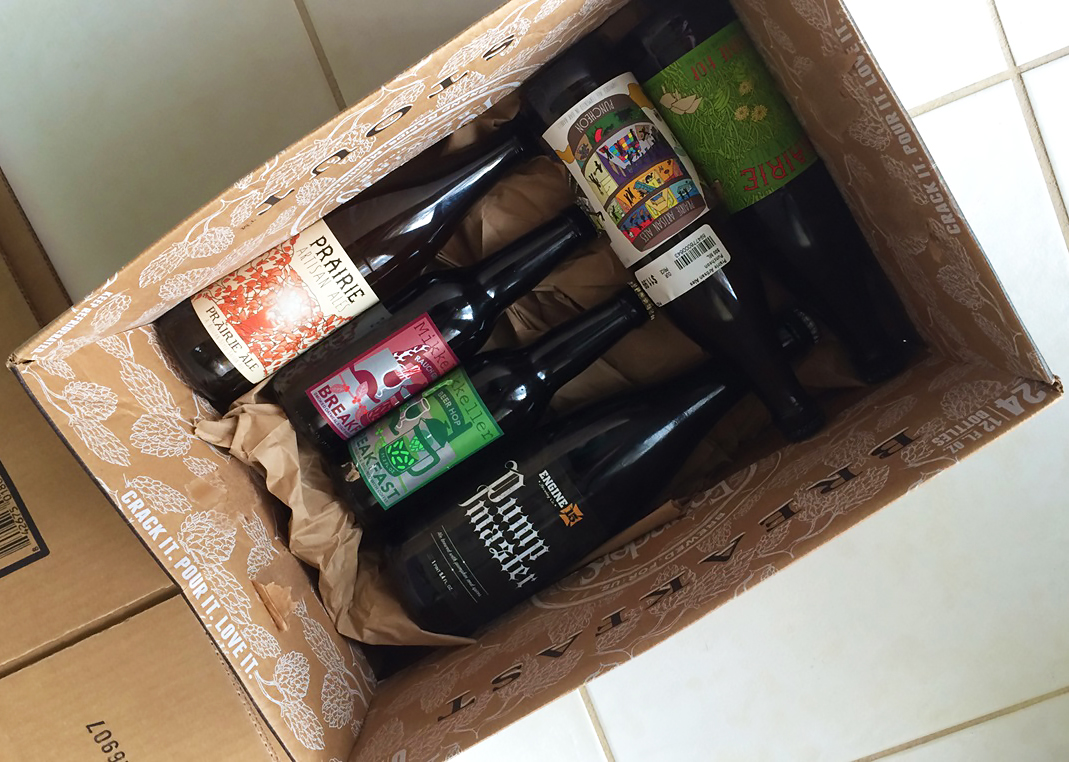
“People now scroll through Instagram, see users showing off their beer, and say ‘Hey, I want to try that’,” says Mark Iafrate, co-founder of The Beer Exchange. “Beer trading has allowed people to become friends with someone on the other side of the country simply from an affinity to want to try new beer.”
One way around the intricacy of shipping is in-person trading, something that Sylvia Benavidez, founder of the app 4TradeCraft, is hoping will increase. The app approaches trading in the same style as dating app Tinder, which matches beers from your cellar with the ones you swipe right on in your geographic area.
“This way you get to know people around you that are interested in beer, too, and appreciate the social aspect of it,” she says. “You build a beer friendship for life.”
Regardless of whether a trade is happening near or far, there is always a question of how to determine what a beer’s worth is and what warrants “a good trade.”
“The value of a beer in the secondary market is whatever people want it to be,” says Iafrate. Essentially, a beer is going to have less value to the person who can walk to the brewery or local bottle shop and get said beer whenever they want. The beers that see action on trading forums are usually limited releases from really small breweries, beers that are restricted to a minuscule geographic area or vintage, barrel-aged beers that have been aged for a while.
Some of the most-traded beers or “whales” on these forums and trading groups (along with their acronym) include Cigar City Brewing’s Hunahpu’s Imperial Stout (Huna), Toppling Goliath’s Kentucky Brunch Brand Stout (KBBS), Founders Brewing’s Canadian Breakfast Stout and Kentucky Breakfast Stout (CBS and KBS), The Alchemist’s Heady Topper (HT), 3 Floyds Dark Lord Imperial Stout (DL), Russian River’s Pliny The Younger (PtY), The Bruery’s Black Tuesday (BT), Dogfish Head’s 120 Minute IPA (120), Goose Island’s Bourbon County Stout line (BCS), and Perennial Artisan Ales’s Barrel-Aged Abraxas (BAA).
As far as what all of this trading means for the industry overall, it seems to be a good thing. The American Brewers Association doesn’t have an official stance on beer trading, but Craft Beer Program Web Manager Andy Sparhawk says it seems to be a fun, communal way to taste and enjoy beer.
As far as the influence on the industry, he says it’s difficult to identify any solid impact because of the post-purchase, consumer-to-consumer aspect of beer trading. “One’s best guess on trading is that it has highlighted and helped amplify many brewers, beers and beer styles to a larger audience that would not have had access to information about these beers before,” Sparhawk says.
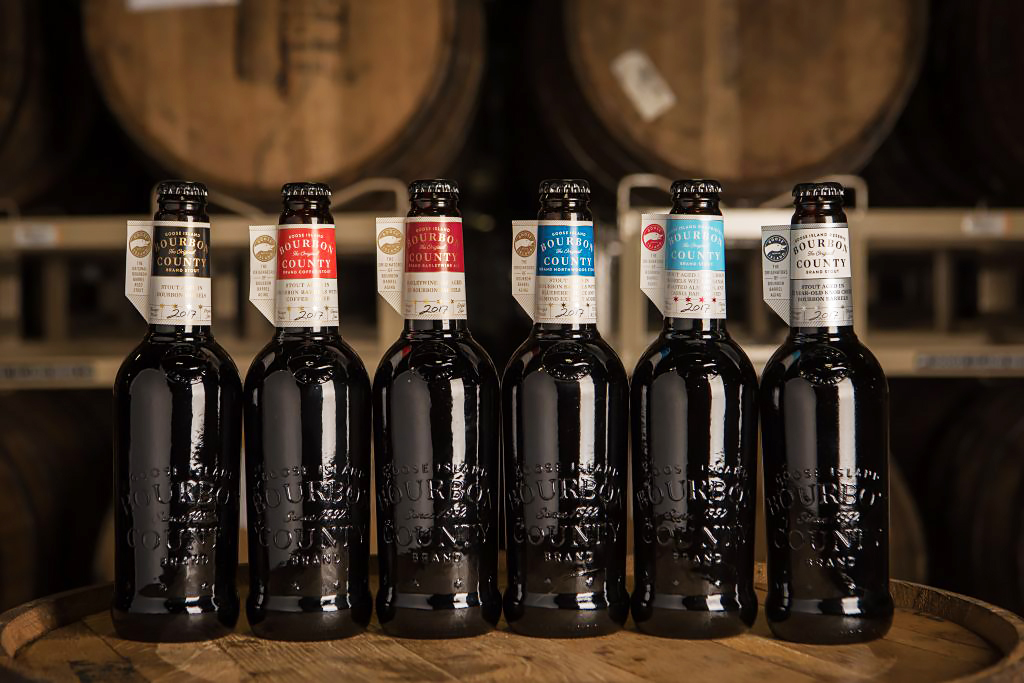
One of the most popular and widely sought after beers via online beer trading is the Bourbon County line of beers from Goose Island.
Photo Courtesy Goose Island Brewing Co.
Iafrate says for breweries, it’s a form of free marketing. “If one of your beers becomes popular, it puts your name on the map, defines your brand, and helps more people try your beer,” he says. He does feel there are cons that aren’t necessarily caused by beer trading, but possibly exacerbated by it. For example, beer traders may spend less time (and money) at their local breweries, and they may be less devoted to their favorite brands in favor of trying new options.
Another potential issue is quality control, which brewers go to great lengths to manage. Once a beer is in the hand of a consumer, there’s no telling if it experienced huge temperature fluctuations, if it’s been properly cellared, or on the other hand, if the beer was even meant to be aged in the first place.
Founders Brewing Co. Brewmaster Jeremy Kosmicki says that while the condition the beer was stored in is a concern when it comes to trading, he feels that people that trade usually know what they’re doing in regards to cellaring practices.
“I suppose there’s also the concern that these people buy up all the local reserves to trade away across the country, leaving the original market in a product deficit,” Kosmicki adds. “But there’s nothing we can really do about that other than set limits on purchases, which most places do anyways.”
Neil Callaghan, El Lector at Cigar City Brewing, says it’s the selling of beer that the brewery is turned off by, not trading. Before a beer is even released, it’s being sold for hundreds, sometimes even thousands of dollars.
“People are paying these outrageous prices where you have no idea how the beer was handled,” Callaghan says. “Plus, someone else is profiting from the brewer’s energy to create this beer and the brewer’s hard work, and it’s not fair,” he says.
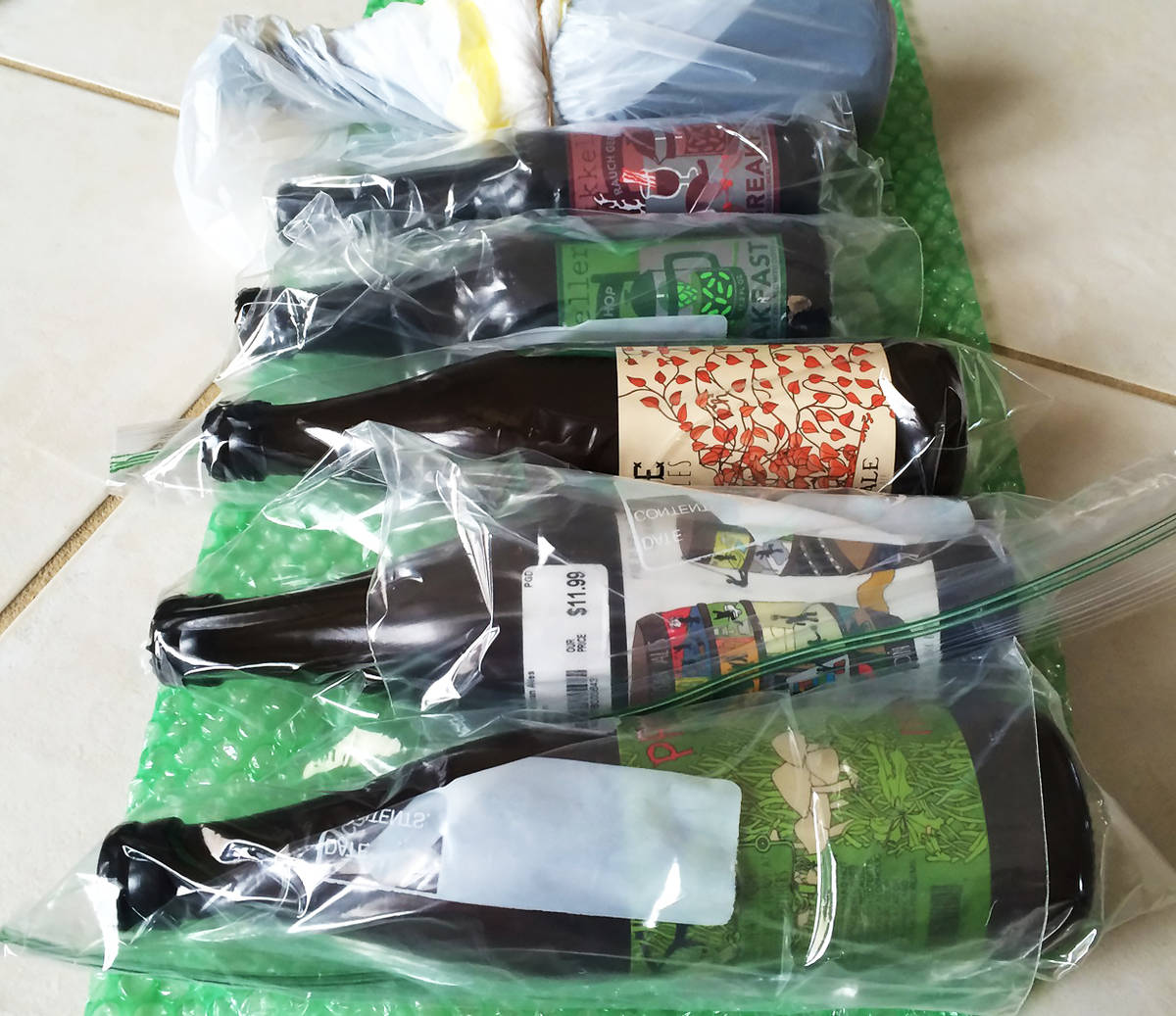
Trading beer online is pretty easy according to Iafrate. "Do a good job packaging your beer, ship when you say you will, and send tracking information. Be direct and, of course, honest about any details of the beer. If a beer breaks in transit, the shipper is responsible to make it right.”
Besides (illegal) price gouging for beer and the lack of quality control, he feels beer trading is a net positive and is essentially exchanging ideas in liquid form. “I think it’s done nothing but elevate the industry,” he says.
While it’s great to know breweries and industry folk feel trading is a good thing, there’s still more to know before jumping in. A certain etiquette is expected when swapping brews among most groups. For starters, don’t start by simply naming the beer you have and seeing what you can get for it. Many groups request you include ISO (in search of) and specify the beer you’re looking for, or at least beers from a certain geographic region.
“It’s pretty basic. Don’t be an asshole,” laughs Iafrate. “Do a good job packaging your beer, ship when you say you will, and send tracking information. Be direct and, of course, honest about any details of the beer. If a beer breaks in transit, the shipper is responsible to make it right.”
Overall, it seems that most people are following the rules of trading. “People are rarely banned,” says Victoria Peters, admin for the No BS Beer Trading group on Facebook with about 7,500 members. And if they are, it’s because they didn’t complete part of their trade. As a trader, she says her experiences have been much more positive than negative.
“Beer trading has opened up a worldwide opportunity to make new friends and try new beer,” she says.
The popularity of beer trading truly reflects the innovation of the industry as a whole and craft beer consumers’ demand for new and exciting experiences. Brewers are tapping into that demand with new styles regularly popping up, like Florida-style IPAs, or unexpected ingredients regularly making their way in (glitter beer, anyone?). Trading is a way to have that imbibing adventure. Keep in mind there is no legal recourse for a trade gone wrong, but if you follow the rules, chances are trading will open the door to countless beers you otherwise wouldn’t have had the opportunity to try.
Notable Online Beer Trading Terms:
Beer Trading has its own language. Here are some popular acronyms to know. For more, check out the Beer Trading Glossary.
FT: For trade
ISO: In search of
$4$: Dollar for dollar
BBA: Bourbon barrel-aged
BA: Barrel-aged
OA: Oak-aged
2:1 or 3:1: Trading one beer that’s worth two or three beers in return
Loon: Brasserie Cantillon
IP: In-person trade
Imp: Imperial
BIF: Beer it forward, where a group of people send beer to one specific person
NBO: New beer it forward opportunity
LIF: Lottery it forward, where a lottery is created to win a beer
Extras: Extra beer or beer-related items put into a trade (coasters, key chains, etc.)
Whale: A rare, hard-to-find beer
Closed: A trade has been completed and no longer accepting offers
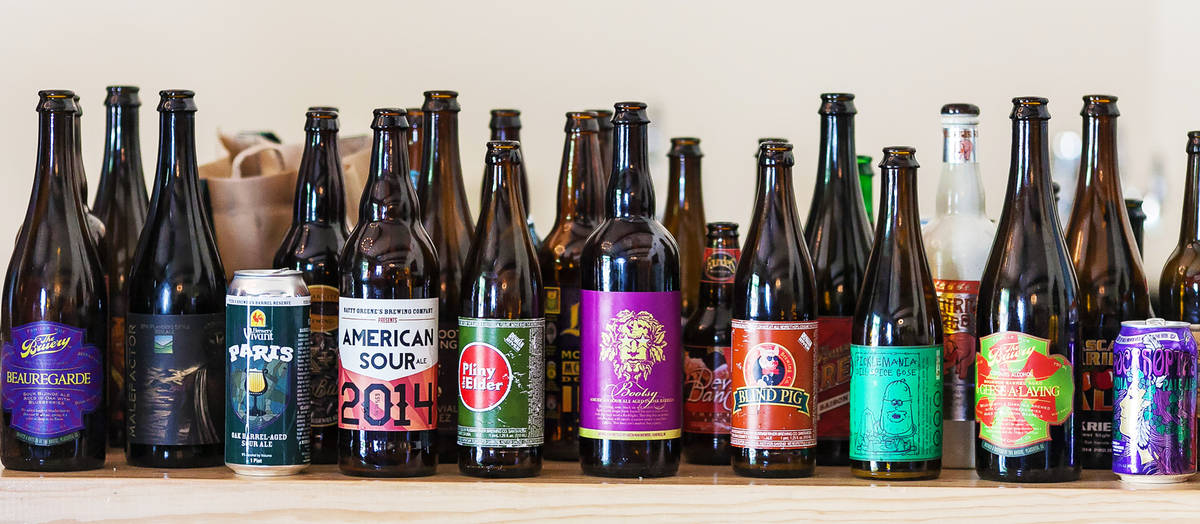
Photos Courtesy The Beer Exchange



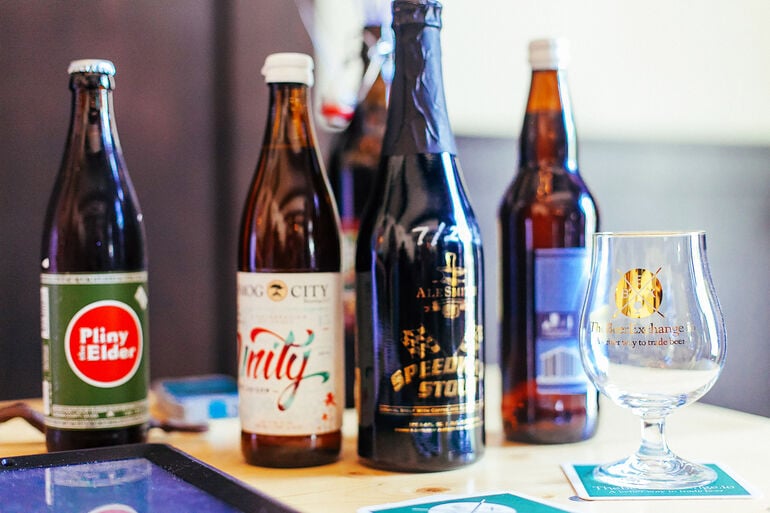
Comments